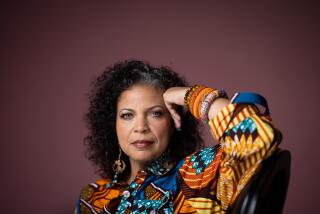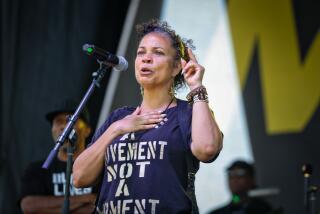The Sudden Rise of Jordan’s Future King
AMMAN, Jordan — In his debut this week as crown prince, Abdullah ibn Hussein seemed at ease as he smiled warmly and clasped hands with the hundreds of politicians, Bedouin tribal leaders and clerics who paraded across the marble floors of Raghadan Palace.
“We should talk--soon,” he whispered to one former prime minister.
“Let’s get together once all these formalities are over,” he told a senator.
The next day, a representative of the world’s only remaining superpower, Secretary of State Madeleine Albright, made a detour during her overseas trip to show support for the future king of Jordan.
Abdullah again beamed, puffed up his chest and, after nearly colliding with Albright’s car door, took her hand and smoothly guided her up a red carpet and into the palace.
“How was your trip?” he asked solicitously.
The eldest son of a seriously ill King Hussein, Abdullah has unexpectedly found himself in charge of this small, strategic country at a time of historic crisis and uncertainty.
Abdullah, who turns 37 today, is a career army officer who is described by those who know him as charming and affable--as his debut demonstrated--but whose political philosophy, viewpoints and abilities are a question mark.
How he will rule, where he will focus his priorities and whether he has the diplomatic skills and intellectual acumen to hold his own against Middle Eastern strongmen--these are only a few of the unknowns swirling around the stocky, light-eyed crown prince who serves as commander of the Jordanian army’s Special Forces.
Born to a British mother, Abdullah was schooled in England and the United States, displays a passion for high-energy sports and--as his first speech to the public showed Friday--speaks better English than Arabic.
In a rare interview published three months ago, Abdullah spoke of growing up in his father’s household and the pressures his family faces, and he alluded only faintly to his own future.
“It is not easy to walk in the footsteps of such a great character,” he told the Arabic-language Al Wasat magazine, which is based in Paris. “If I’m able to accomplish a small portion of what my father did, I will die happy.”
Part of the mystery around Abdullah stems from the fact that few Jordanians ever expected to see him in the role apparently thrust upon him.
In a head-twirling chain of events steeped in palace intrigue and political maneuvering, Hussein, 63, came home from six months of cancer treatment last week and abruptly removed his long-standing heir, younger brother Hassan, 51. In his place, the king appointed his eldest son, then just as abruptly departed Jordan again with an announcement from doctors that the cancer had recurred.
He is fighting for his life at the Mayo Clinic in Rochester, Minn.
Hussein’s death will send shock waves through Jordan, where most citizens have known no other monarch, and throughout the region, where the king and the stability of his country are considered crucial to peace.
As long as a decade ago, Hussein told confidants of his desire to change the line of succession to include his sons. But the wide belief was that Hassan would assume the throne and then, later, one of Hussein’s sons--probably the favored Hamzah, by his current, American-born wife--would succeed Hassan.
Abdullah’s name rarely came up. He, instead, was being groomed to become commander of the Royal Jordanian Armed Forces, associates say. With the king’s health taking a sudden turn for the worse, and Hassan reportedly resisting changes to the succession, Abdullah was elevated to crown prince and acting regent.
Associates say King Hussein sees a lot of himself in Abdullah. Unlike the bookish Hassan, Abdullah shares Hussein’s military training and passion for fast cars, motorcycles and skydiving. He also shared his father’s earlier reputation for enjoying the good life, although care has been taken in recent years to tone down that image.
“When I was young I used to like dangerous sports,” Abdullah told the magazine. “But then these sports became difficult for me, as for any athlete who gets older. And don’t forget: I got married and had children. I don’t have the enthusiasm that was in my heart when I was in my 20s.”
In 1993, Abdullah married Rania Yassin, a striking Jordanian woman of Palestinian origin whose family was living in Kuwait at the time of the 1991 Persian Gulf War but had to leave when the Palestinians were expelled.
Abdullah and Rania have two children--4-year-old son Hussein and 2-year-old daughter Iman.
Abdullah’s mother was the daughter of a British army officer working in Jordan. Toni Gardiner converted to Islam, took the name Muna and, in 1961, at age 19, became King Hussein’s second wife. Apparently as part of their divorce agreement a decade later, she does not speak publicly about those years or the royal family but continues to live in Amman.
Abdullah was shipped off to boarding school in England at age 4 and, like most of the Hashemite men, attended Britain’s Royal Military Academy at Sandhurst. Stints at Oxford and Georgetown followed.
He was described as a good student but not overly intellectual.
“He doesn’t surround himself with what is called eggheads,” said a member of the Hashemite dynasty who spoke on condition he not be identified.
With an Israeli professor at Georgetown, Abdullah wrote a master’s thesis that appeared to defend Israel’s military actions in the late ‘60s against Palestine Liberation Organization guerrillas, with whom Jordan at the time was also at war.
“Prince Abdullah . . . never told anyone that he was King Hussein’s son, never displayed his status as a member of the royal family, demanded and received treatment identical to every other student,” the professor, Alon Pinkas, told an Israeli newspaper this week.
In contrast to the picture of scheming, backbiting royals that emerged here in recent days, Abdullah is said to maintain good relations with his siblings and cousins. He has made a point of having at least four of his generation of princes at the ceremonies and events he has attended in the last few days.
Rivalry with Hamzah, the prince whom Hussein is believed to favor, is not visible, either; Abdullah reportedly accompanied his younger half-brother to his enrollment at Sandhurst.
Hussein may have ultimately chosen Abdullah over the 18-year-old Hamzah because he realized that he will not live long enough to prepare the youth for the throne. Abdullah also has an automatic power base in the military, including the important intelligence apparatus.
As eldest son, Abdullah also enjoys constitutional legitimacy.
The direction he takes as a ruler will depend on the counsel he keeps. He will be under pressure to appease various elites, while the masses would like to see greater democratization and a strengthening of their political institutions, such as parliament.
He has already begun to turn to some of his father’s closest aides, and he asked for meetings with many of the 13 prime ministers that Jordan has had in the last 20 years.
Abdullah’s ascension represents the advent of a new generation of the tiny Hashemite clan, and many Jordanians hope that the future king will follow through with economic reform and a modernization of the nation.
No one is watching Abdullah more closely than Israel, which wants a stable Jordan and strong leadership lest Palestinian unrest here spill into Israeli-occupied territories. Israelis worry chiefly that Abdullah is an unknown entity; on Friday, Israeli Prime Minister Benjamin Netanyahu telephoned Abdullah to offer support, and he reported that the new regent promised to continue Jordan’s uniquely friendly relations with Israel.
Abdullah also has developed close friendships with the princes of the Gulf states, many of whom, like him, are commanders in their armed forces. The Saudi defense minister was among the first to fly to Amman to offer congratulations.
On Friday, Abdullah appeared nervous making the speech, a televised address to Middle Eastern interior ministers. In the recent magazine article, he spoke of how he deals with fear.
“I act in a calm way when I am in danger,” he said. “And I don’t feel fear until after the operation is finished. . . . Nobody does not feel fear. In the army, we train for it. We learn to control fear.”
(BEGIN TEXT OF INFOBOX / INFOGRAPHIC)
Jordan’s Royal Family
The Hashemites claim to be direct descendants of the Prophet Mohammed. Al-Hussein ibn Ali, the Sherif of Mecca and King of the Arabs, led the Arab Revolt of 1916 that ejected the Ottoman Turks from Arab lands. He was King Hussein’s great-grandfather. Hussein’s grandfather, Abdullah, became king of Jordan when it was created by the British after World War I.
TALAL & QUEEN ZEIN AL SHARAF
MUHAMMAD
Married Princess Firyal Irsheid
(Son, Talal)
(Son, Ghazi)
Married Princess Taghreed Majali
*
HASSAN
Married Princess Sarvath
(Daughter, Rahma)
(Daughter, Sumaya)
(Daughter, Badiya)
(Son, Rashid)
*
BASMA
Married
(Son, Farah)
(Son, Ghazi)
(Son, Sa’ad)
(Daughter, Zein)
*
HUSSEIN (King of Jordan)
Married (1955-57): Princess Dina Abdel Hamid
(Daughter, Alia)
*
Married (1961-71): Princess Muna (nee Toni Gardiner)
(Son, Abdullah)
(Son, Faisal)
(Daughter, Zein)
(Daughter, Aisha)
*
Married (1972-77): Queen Alia Touqan
(Daughter, Haya)
(Son, Ali)
(Adopted daughter, Abeer Muhaisen)
*
Married (1978 to present): Queen Noor (nee Lisa Halaby)
(Son, Hamzah)
(Son, Hashim)
(Daughter, Iman)
(Daughter, Raiyah)
More to Read
Sign up for Essential California
The most important California stories and recommendations in your inbox every morning.
You may occasionally receive promotional content from the Los Angeles Times.











